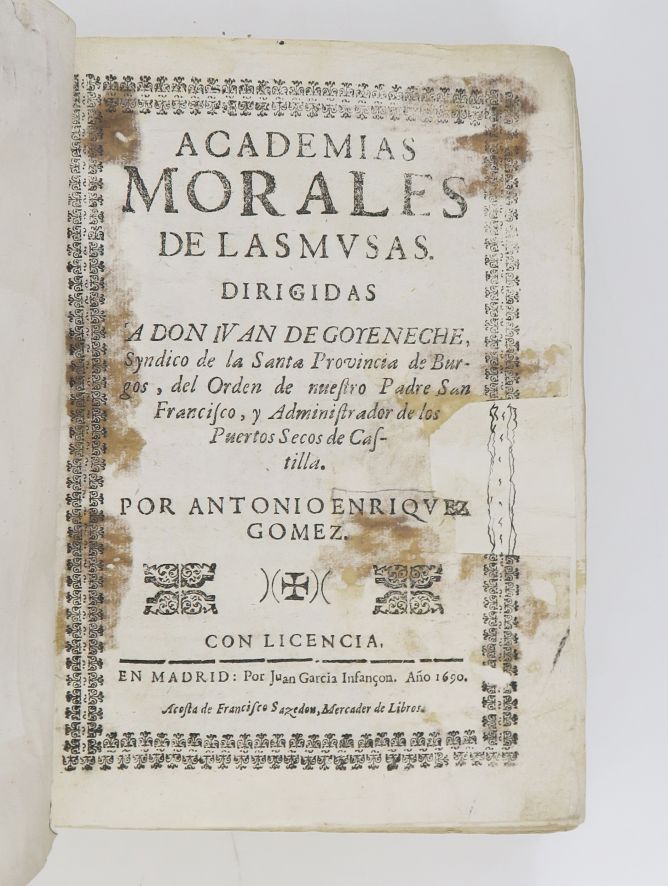Description
GOMEZ (Antonio Enriquez). Moral academies of the muses. Dirigidas a Don Juan de Goyeneche... Madrid, Juan Garcia Infançon, 1690. In-4 of [4] ff. 266-[2] pp. ivory vellum, smooth spine, handwritten title on spine. Title page restored with tears and soiling, lower corner of last index leaf cut out with small loss of text. Rare late 17th century edition, probably the fifth, of this rare and important Spanish author. Son of Portuguese Jews, Enríquez Gómez (1600-1663), was probably born in Cuenca (some say Segovia, others Lisbon). He joined the army at the age of 20 and rose to the rank of captain before fleeing to France in 1636 due to growing suspicion of his religious beliefs. He lived in Bordeaux, Rouen and Paris, where he was appointed secretary to Louis XIII. While in France, Enríquez Gómez also had a brilliant career as a novelist, poet and playwright. Although there are rumours of earlier publications, his first book to be published with certainty (preceded only by a pamphlet, Triumpho lusitano, published in 1641), is this collection of Academias morales (Bordeaux, 1642), which contains various poetic works and four comedies. Probably because of its rarity, some bibliographers, having never seen a copy, repeat the erroneous and unlikely date of 1612 instead of 1642 for the first edition. Two years later, he published perhaps his best-known work, the picaresque novel in verse: El siglo pitagórico y vida de D. Gregorio Guadaña (Rouen, 1644). Enríquez Gómez's dramatic output includes more than two dozen comedies, most of them composed in the manner of Calderon, and may include several plays written under the pseudonym of Fernando de Zárate. The Inquisition was a frequent target of Enríquez Gómez's pen, especially in the second part of his Política angélica (Rouen, 1647), where he calls for various reforms, especially a relaxation of the emphasis on the "limpieza de sangre" that may have caused his own flight a decade earlier. Although he was burned in effigy at an auto da fé in Seville in 1660, Enríquez Gómez returned soon after. He was arrested by the Inquisition and died in Seville in 1663, probably in prison.
1289
GOMEZ (Antonio Enriquez). Moral academies of the muses. Dirigidas a Don Juan de Goyeneche... Madrid, Juan Garcia Infançon, 1690. In-4 of [4] ff. 266-[2] pp. ivory vellum, smooth spine, handwritten title on spine. Title page restored with tears and soiling, lower corner of last index leaf cut out with small loss of text. Rare late 17th century edition, probably the fifth, of this rare and important Spanish author. Son of Portuguese Jews, Enríquez Gómez (1600-1663), was probably born in Cuenca (some say Segovia, others Lisbon). He joined the army at the age of 20 and rose to the rank of captain before fleeing to France in 1636 due to growing suspicion of his religious beliefs. He lived in Bordeaux, Rouen and Paris, where he was appointed secretary to Louis XIII. While in France, Enríquez Gómez also had a brilliant career as a novelist, poet and playwright. Although there are rumours of earlier publications, his first book to be published with certainty (preceded only by a pamphlet, Triumpho lusitano, published in 1641), is this collection of Academias morales (Bordeaux, 1642), which contains various poetic works and four comedies. Probably because of its rarity, some bibliographers, having never seen a copy, repeat the erroneous and unlikely date of 1612 instead of 1642 for the first edition. Two years later, he published perhaps his best-known work, the picaresque novel in verse: El siglo pitagórico y vida de D. Gregorio Guadaña (Rouen, 1644). Enríquez Gómez's dramatic output includes more than two dozen comedies, most of them composed in the manner of Calderon, and may include several plays written under the pseudonym of Fernando de Zárate. The Inquisition was a frequent target of Enríquez Gómez's pen, especially in the second part of his Política angélica (Rouen, 1647), where he calls for various reforms, especially a relaxation of the emphasis on the "limpieza de sangre" that may have caused his own flight a decade earlier. Although he was burned in effigy at an auto da fé in Seville in 1660, Enríquez Gómez returned soon after. He was arrested by the Inquisition and died in Seville in 1663, probably in prison.
